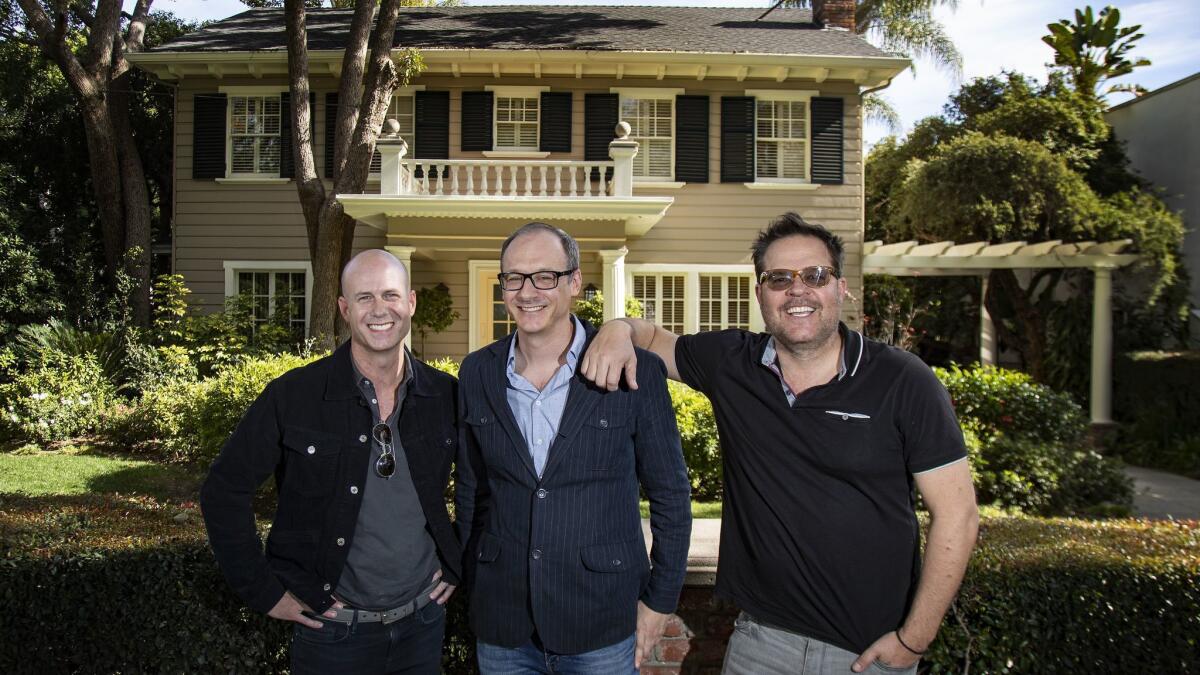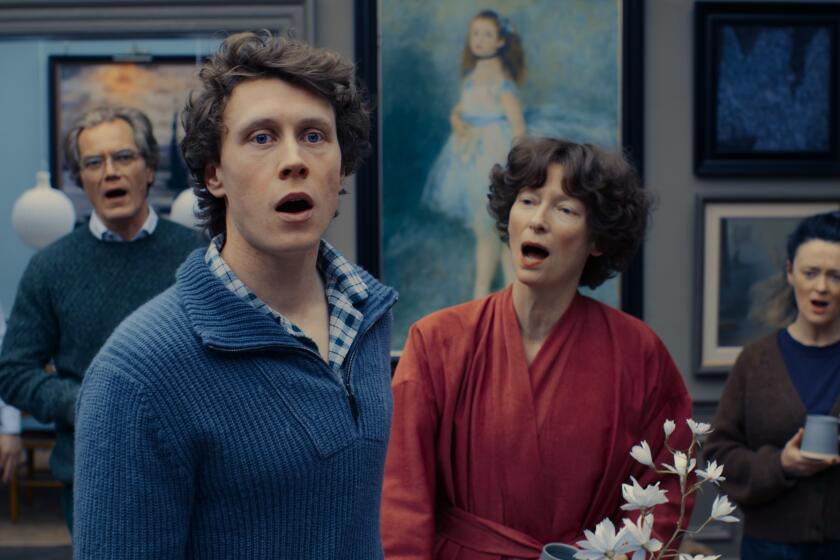‘The Prodigy’ filmmakers play tricks with the tropes of evil-kid movies
- Share via
In the new horror movie “The Prodigy,” out Friday, a mother’s love is put to the test when her precocious young son begins to exhibit signs of an otherworldly possession.
Despite the spooky overtones, the mother-child dynamic at the heart of the film inspired scriptwriter Jeff Buhler’s wife to organize a special screening for an unsuspecting audience.
“On opening weekend, she’s organizing like 30 moms from my kid’s school to go see this movie,” said Buhler with a laugh. “She’s telling them it’s all about parenting and they’re all excited to come. And then we’ll be changing schools next year.”
We’re standing in front of the Tommy Doyle house from John Carpenter’s 1978 genre classic “Halloween,” a large but unremarkable Dutch Colonial just north of Sunset Boulevard in Hollywood and one of several spots on a tour of horror movie locations in the area.
“‘Halloween’ was probably one of the trigger points for me that anchored me in the genre,” said Buhler. “I remember being too young to go to a rated-R movie when it came out but sneaking in with my sister and friends who were older. It was one of those experience when I knew immediately that I was not prepared for what I was going to see.
“What Carpenter did that was so genius, and that you can see throughout the genre since then, was take suburban family life and insert horror and danger into it. And that’s sort of the touchstone of ‘The Prodigy,’ that idea of taking safe places or relationships and inserting some form of threat into it.”
In the film, “Orange Is the New Black” star Taylor Schilling plays Sarah, a first-time mom whose gifted and talented young son Miles (Jackson Robert Scott) begins to develop a disturbingly unpredictable dark side. For Buhler and director Nicholas McCarthy, it was just as important to focus on the pitfalls of new parenthood as it was to pack in the scares.
“There’s a lot of pressure in our society and also a lot of anticipation that people have for what it’s going to be like to be a parent and how exciting that change is in your life,” said Buhler.
“We wanted to explore this idea of a young couple that had really worked hard to get to this place and the cherry on top would be that they are having their first child. And then the flip side of that is that when you have a child, you never know who that person is going to be. You’re basically inviting a stranger, a person you’ve never met before, to live with you for the rest of your life.”
“And that’s the mistake I think all parents make,” joked McCarthy, whose previous genre work includes the indies “The Pact” and “At the Devil’s Door.” “But it’s true that if you think you know what being a parent is going to be like, you have no idea. It was one of the first things I responded to when I read the script. But it also feels like a metaphor for working in Hollywood.”
“It does?” asked Buhler. “How so?”
RELATED: ‘The Prodigy’ director Nicholas McCarthy shares his biggest horror influences »
“You have all your hopes and dreams, all your ideas about how it’s going to go and then you just have your soul crushed by a murderous sociopath.” They burst into laughter.
“There’s one other metaphor that we talked about while we were working on this project, which was the anxiety as a parent that you feel for your child,” chimed in producer Tripp Vinson. “And if you’ve noticed or are concerned that something’s wrong, what does that do to you? What does that do to your marriage?”
“Not only are you inviting a stranger in, but you’re inviting change into yourself that you can’t predict,” added Buhler. “And you have to just make the leap. With a horror movie, what you’re doing is taking those things that everybody understands and exaggerating them to a place where they really start to make you think about ever having children. Our goal with this movie was not to depress the birth rate, but it’s as important to focus on what’s happening with Sarah and the changes that she goes through in her marriage [as what happens with Miles].”

RELATED: A timeline of horror - Influential moments from ‘Nosferatu’ to ‘Paranormal Activity’ »
“The Prodigy” falls squarely into the evil or creepy kid subgenre of horror that was pioneered by movies like “The Bad Seed” (1956) and “Village of the Damned” (1960).
“If you look at these movies collectively, these stories almost feel like parables from the Bible,” said McCarthy. “They feel like these moral object lessons where we’re being asked, ‘What would you do if your child was capable of something awful?’”
Though the film’s premise feels predictable, there is a twist in the third act that horror audiences will not see coming, something the filmmakers hope will quell the comparisons to memorable contemporary films in the genre such as “The Omen” and “The Good Son.”
“We didn’t want to end on one of the big tropes of the genre where an expert character comes in and then there’s some kind of ritual that makes everything go away,” said Buhler. “It was really important to us to find a departure from that.”
“But it doesn’t end well,” Vinson said. “That’s the spoiler.”
“They never end well,” McCarthy said. “All those movies end with the destruction of the parent. They’re about the transformation you are forced into when you have a child. You have to accept that your life has vanished, or whatever version you thought you had of your world will be destroyed.”
These stories almost feel like parables from the Bible ... where we’re being asked ‘What would you do if your child was capable of something awful?’
— Director Nicholas McCarthy
Another goal of the filmmakers was to create a movie that fit into the landscape of “elevated horror,” which conjures the bulk of its fear factor out of realistic settings and ideas.
“We wanted to keep everything grounded in the real world and to tell a story that felt like it could really happen,” said Buhler. “And I think that fits into a lot of what’s happening right now in the genre.”
One of the ways they sought to accomplish that was to inject horror themes into settings and institutions that people inherently associate with safety and familiarity.
“There’s a million horror movies and they’re all set in these suburban houses or very familiar locations,” Vinson said. “When we were working on this, that was very specific. We wanted this movie to take place in a neighborhood that you could recognize.”
SPECIAL REPORT: The age of horror (2017) »
The filmmakers drew inspiration from Jordan Peele’s “Get Out” with respect to sneaking social commentary into the oft-disparaged horror genre.
“Horror as a genre has always been sort of the stepchild and it’s rarely critically revered,” said Buhler. “Now it feels like what we refer to as ‘elevated horror’ has started to creep back into appreciation by mainstream press and critics, but that’s relatively new.”
“When you look at the success of a movie like ‘Get Out,’ which is reflecting horror that exists in our society, in a sense we’re looking in a mirror at all these things that are very difficult for people to talk about,” he said. “Genre allows you to explore it because you take this leap of faith like, ‘Oh, we’re in this crazy world where crazy stuff happens.’”
“It’s almost controversial to say, ‘Having a child could be a mistake, or dangerous,’” he added. “Like, that’s not something you can talk about. And so genre allows you to sort of hold up a mirror that makes people think about their own feelings. I think there’s a wave of genre films that are doing that really well right now and I would say we sort of fit into that universe.”
“Well, we hope to,” Vinson said.
“One of the things that I’m most proud of in the movie is it’s not a sequel or a remake,” said McCarthy. “It can be great to watch a movie that is revisiting old ground, but along with this culture of remakes and reboots there’s clearly, I think, an appetite for new stories. When I first saw the poster for our movie at the Arclight, every other movie in the line of posters was a sequel or a remake. And the top of our poster did not say, ‘The next chapter in “The Conjuring” universe’ or something like that. I feel like that’s a feat.”
follow me on twitter @sonaiyak
More to Read
Only good movies
Get the Indie Focus newsletter, Mark Olsen's weekly guide to the world of cinema.
You may occasionally receive promotional content from the Los Angeles Times.











